The orchid has both its challenges and opportunities on the Dutch market. The plant remains popular, especially the Phalaenopsis variety, which sells well in the Netherlands and Europe. However, there are more varieties that have not yet received the recognition they deserve, says Jolanda Nieuwenhuijze of De Hoog Orchids. At this company, everything revolves around a passion for orchids.
Today on International Orchid Day, Jolanda tells more about a number of different varieties such as the Nobile and Variegata.
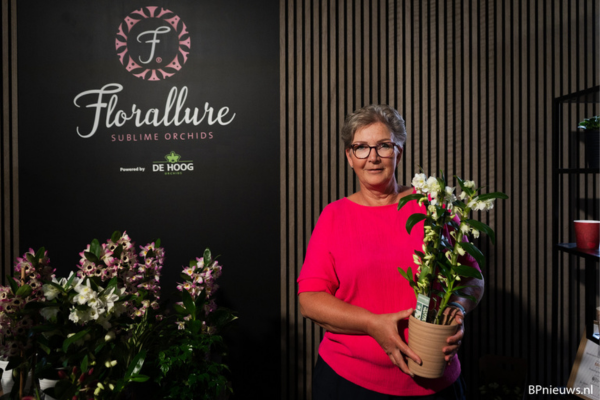 Jolanda Nieuwenhuijze, De Hoog Orchids
Jolanda Nieuwenhuijze, De Hoog Orchids
An exclusive and unpredictable orchid
Her absolute number one? The Rhynchostylis Gigantea, an orchid that is not only exclusive, but also unpredictable, according to Jolanda: "This orchid only blooms in the winter, when it feels like it. That makes it a challenging for ornamental horticulture, but for me that is precisely what makes it fascinating. The plant has a unique appearance with hanging flowers that spread an intense perfume, varying from a soft vanilla scent to a strong, spicy scent. Everyone wants this plant but it is difficult to control, making it all the more special." She continues: "The plant is only available in a mix because we never know what color it will appear in. From pure white to purple spotted, it is all possible."
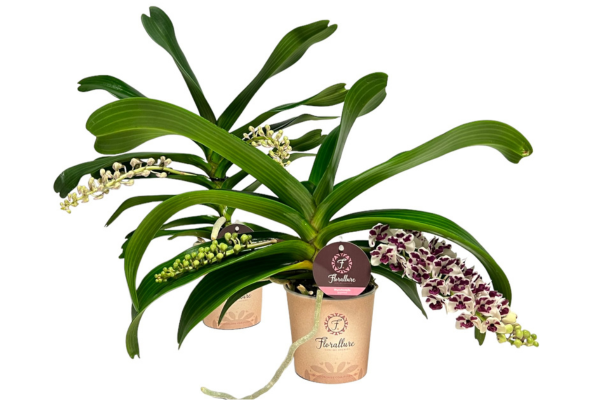
Rhynchostylis Gigantea
Intense purple
Another favorite is the Bouquet Purple Rain, a newcomer that has gained a lot of popularity in the last six months. "This orchid produces flowers in a circle, which makes it an ideal table plant. This is also where it gets its name from. It looks like a bouquet with an intense purple color and serrated flowers," says Jolanda. "This plant has very long color tones and a closed bud, making it perfectly suitable for retail. When it opens after a long time, you see the large, serrated flower."
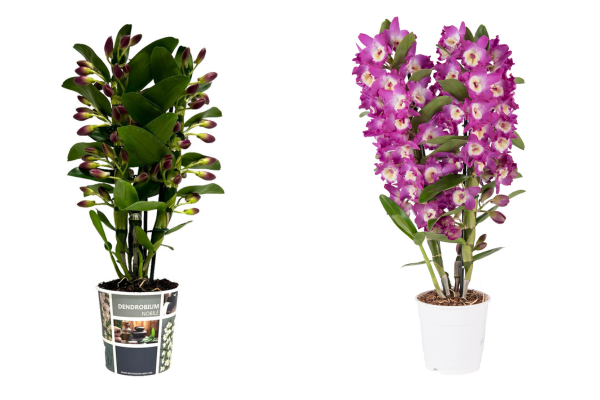
Bouquet Purple Rain
Graceful lady
The Nobile Bright Eye is another highlight. It has a pink flower and a light heart. A very feminine orchid, Jolanda thinks: "It smells wonderful, has a beautiful arrangement on the stem, and blooms for a long time. When it is in bloom, you really see a graceful lady in front of you. The scent and shape make this orchid a top choice although preferences vary."
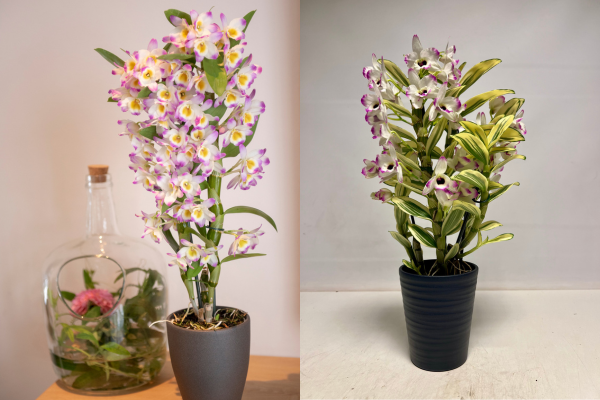
Nobile Bright Eye and the nameless variegated variety
A nameless variety
There is another new variety in the pipeline: a variegated orchid without a name, but with a color that Jolanda has not seen before in one of their plants. "This variegated variety is beautiful, but is still nameless," she laughs. "It has come a long way. Since it is a variegated variety, it takes a long time before it is launched onto the market. In the laboratory, it has to be proven that it is indeed variegated. The challenge with such varieties is to distribute it properly among those in the ornamental horticulture sector. Many of our relations would like to have the variety, yet eventually there's only a small group of end-consumers."
A long-lasting process
For three generations, De Hoog Orchids have been searching for exotic species, and has been breeding and crossing new orchids. This requires a lot of patience. "Sometimes it takes ten years before a new species can be launched on the market. Tissue culture in the lab already takes about three years. If we do the cross-breeding it is a bit easier. However, it takes about 6 to 6 years before there will have ten new plants. Then the plants still have to go to the lab for propagation, and then we have to see if the cultivation process in the garden is going well," says Jolanda. "Yet we always keep looking for new possibilities, we love to innovate."
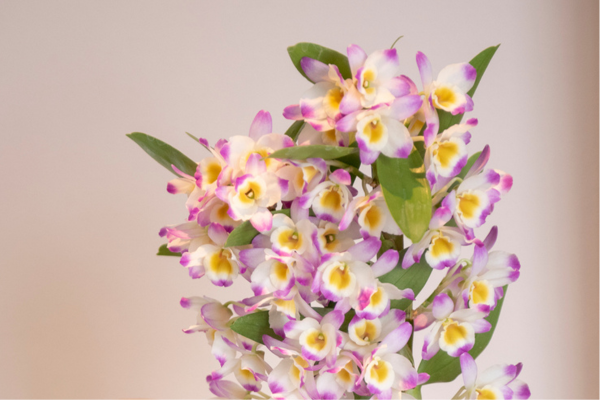
Nobile Bright Eye
Testing and trying
It all began when father and son, a few generations ago, went to Brazil to discover new varieties, says Jolanda. "They came across the Nobile there, which they brought to the Netherlands. The Nobile needs cold and darkness. In the western hemisphere, it only blooms during the first six months of the year. Thanks to a lot of testing and trying with refrigerators, light and containers, we eventually were the first to succeed in growing the Nobile all year round."
With almost 100 years of experience in ornamental horticulture, De Hoog Orchids hopes that consumers will increasingly appreciate the beauty and diversity of orchids." There's so much more than the Phalaenopsis," Jolanda emphasizes. "We hope that people will see the love and craftsmanship behind each plant."
For more information:
Jolanda Nieuwenhuijze
De Hoog Orchids
+31 (0) 6 24 86 10 86
[email protected]
www.dehoogorchids.com
